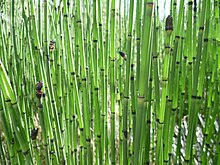| Equisetum praealtum | |
|---|---|
 | |
| Equisetum praealtum by the Columbia River at Spanish Castle, Douglas County, Washington | |
| Scientific classification | |
| Kingdom: | Plantae |
| Clade: | Tracheophytes |
| Division: | Polypodiophyta |
| Class: | Polypodiopsida |
| Subclass: | Equisetidae |
| Order: | Equisetales |
| Family: | Equisetaceae |
| Genus: | Equisetum |
| Subgenus: | E. subg. Hippochaete |
| Species: | E. praealtum |
| Binomial name | |
| Equisetum praealtum | |
| Synonyms [1] | |
| |
Equisetum praealtum, [1] the scouringrush horsetail, [2] is a species of Equisetum (horsetail) native to North America and northeastern Asia. [1] It was formerly widely treated as a subspecies or variety of the European and west Asian species Equisetum hyemale (rough horsetail), and still is by some authorities. [3]